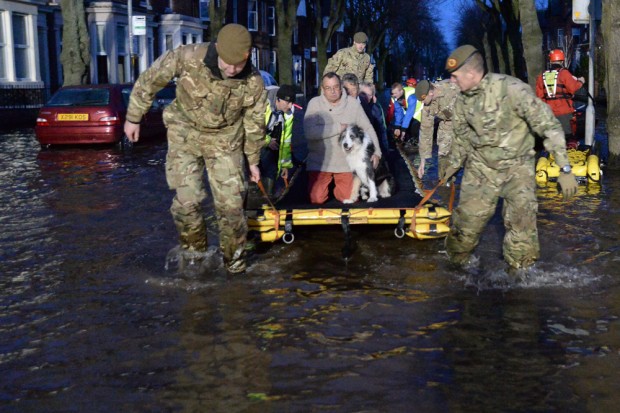Today's Defence news focuses on the Army's deployment to help those hit by flooding in north-west England and Coalition strikes against Daesh in Syria.
FLOODING
All newspapers give prominent coverage to the weekend’s floods in north-west England and the Army’s involvement in the relief operation. Among others, The Guardian and Daily Mirror report the Army was deployed to help flood hit communities in the north of England after Storm Desmond left at least 60,000 homes without power and many without clean water.
Army personnel from 2nd Battalion Duke of Lancaster's Regiment, based in Weeton Barracks near Preston, were deployed yesterday to assist with the flooding response operation. For a full breakdown of their assistance in Carlisle and elsewhere on Sunday, read here.
SYRIA
Coverage of UK air operations against Daesh in Syria and Iraq continues, after the RAF flew its first offensive operation on terrorist targets inside Syria on 3 December.
The Daily Telegraph reports that President Bashar Assad has claimed the UK bombing campaign in Syria is illegal and will only cause the "cancer of terrorism" to spread. In the same newspaper, London mayor Boris Johnson calls for the UK to work with Assad and Russian president Vladimir Putin to defeat Daesh. In another follow-up article from the weekend, the Daily Mail reports Defence Secretary Michael Fallon’s comment that civilian casualties in Syria cannot be ruled out as “war is messy”.
The Sun reports that British fighter jets were forced to stop the bombing of Daesh militants on Saturday as essential maintenance was carried out. Ten £30m Tornados and six £86m Typhoons were grounded at RAF Akrotiri, they write, with a maintenance crew worker saying there had previously been radar electrical faults but that this was down to an "increase in operating hours". Our line was not carried.
A Ministry of Defence spokesperson said:
“Our aircraft fly round the clock in the campaign against Daesh and we undertake regular maintenance to ensure that aircraft and crews are performing at their best.”
ARMY RECRUITMENT
For the past few months, BBC Newsbeat have been working with the Army to show the experience of new recruits as they undergo initial training at ATC Pirbright. Unfortunately, today’s coverage contains some inaccuracies about Army manning levels.
It was suggested that over the past ten years the Army has not been sufficiently manned, falling below its ‘published requirement’. However, this is not the case. The Army 2020 programme sets out how the Army would reduce in size to 82,000. The published requirement is an administrative figure that tracked how we planned to reach this target between 2010 and 2020. The Army is not seeking to man to this published requirement (referred to in our statistics as structural liability), and is not indicative of what the Army can or cannot do.
The Government is committed to an Army of 82,000, as set out in the manifesto and in the Strategic Defence and Security Review 2015. As Major General Chris Tickell said in his interview, we know that recruitment is a challenge, however, we are very clear that the Army has enough people to meet all of its commitments across the world.
Our full statement is below:
A MOD Spokesperson said:
Britain’s Armed Forces are world class and we know how important it is to invest in them, which is why we have committed to spending 2% of GDP on Defence for the next decade, including £178 billion to make sure our people have the equipment they need to keep Britain safe.
“More and more people are beginning a career in the Armed Forces, with over 8,000 joining the Army Regulars in the past year. However, as the economy grows we will face increased competition in recruitment across the services. We are taking significant steps to address this challenge and we will continue to meet all of our commitments at home and abroad.

Follow us on Twitter and don’t forget to sign up for email alerts.
